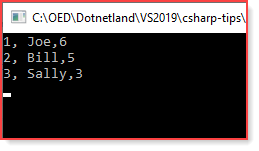11,570 questions
Hello @Sudip Bhatt
See if this will give you what you are looking for using C#9

using System;
using System.Collections.Generic;
using System.Linq;
namespace ConsoleApp1
{
class Program
{
static void Main(string[] args)
{
var results = Mocked()
.GroupBy(person => person.Customer)
.OrderByDescending(group => group.Max(person => person.Total))
.Select(group => group.OrderBy(person => person.Total))
.Select((people,index) => new {RowIndex = index +1, item = people})
.ToList();
foreach (var result in results)
{
Console.WriteLine($"{result.RowIndex}, {result.item.LastOrDefault()}");
}
Console.ReadLine();
}
static List<Person> Mocked()
{
var list = new List<Person>
{
new() {Id = 1, Customer = "Sally", Total = 1},
new() {Id = 2, Customer = "Joe", Total = 2},
new() {Id = 3, Customer = "Bill", Total = 5},
new() {Id = 4, Customer = "Sally", Total = 3},
new() {Id = 5, Customer = "Joe", Total = 6}
};
return list;
}
}
public class Person
{
public int Id { get; set; }
public string Customer { get; set; }
public int Total { get; set; }
public override string ToString()
{
return $"{Customer},{Total}";
}
}
}
